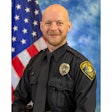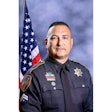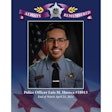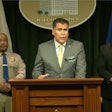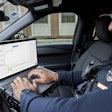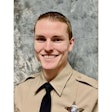Few citizens are unaware of what it means to see police cars with their emergency lights and headlights on, slowly following one another for blocks and sometimes miles. For the more than 700,000 sworn law officers in America today, for whom the possibility of being killed in the line of duty has always been a known hazard, it is a somber and moving experience. But what is it that makes the public pay so much attention to the death of a policeman or -woman.
At a September 1997 memorial service, the Rev. Paul Keeter, pastor at the Hope Mills Church of God, commented on the death of North Carolina Trooper Ed Lowry and Cumberland County Deputy Sheriff David Hatchcock. Both officers had been gunned down on Interstate 95 a few days earlier. Said Keeter, "The bullet that killed Officer Lowry (a member of his congregation) was in fact meant for society as a whole. He stood between us and the crime that goes on in this society. To me, he was a guardian angel in a uniform."
The Rev. Mark Pruden, a police chaplain in Cincinnati, echoed this sentiment during the 1997 funeral mass for Officer Daniel Pope, one of two officers shot to death while trying to make a felony domestic violence arrest. "Killing a cop fractures the very foundation upon which our society is built and rips apart the very basic fabric from which our society is made. Killing a cop doesn't just break the law. Killing a cop demonstrates the epitome of contempt for the God who created the world and the laws provided. That's why an entire city grieves when a cop is killed."
Comrades in Arms
In olden times, Viking warriors were sometimes given a funeral on a ship set ablaze and then cast off to sea. It is not difficult to see the similarities from this past ritual and the human need to honor a fallen comrade in arms in modern-day society.
Officers realize the need in this business to depend on each other for backup in dangerous situations or for moral support in dealing with stressful circumstances. They soon learn that they have become part of a family that spans jurisdictional boundaries. No matter what agency you work for, the unity of purpose and the shared hazards of the job are a binding tie. For Debbie Havran, a 911 dispatcher in Cortez, Colo., "Police workers are a family-we deal with some of the most bizarre, some of the most obnoxious, some of the stupidest, and some of the most dangerous problems that people can conjure up. Funeral attendance shows respect for the family, love for the officer, admiration for the profession and shares the grief."
Processions of Friends and Families
Unfortunately, the headlines informing us of officers' deaths seem to persist. In the fall of 1996, Marilyn Narvaez attended the funeral for slain NYPD Officer Anthony Mosomillo. Narvaez, an officer's widow herself, commented, "You hope it's the last funeral you go to where a cop is killed by some bad guy, but somehow you know it is going to happen again."
The response to officer deaths in the line of duty has grown in the past few decades. In 1995, more than 2,000 officers attended a funeral for Pierce County (Wash.) Deputy John Bananola. Some traveled thousands of miles to be there.
At one NYPD funeral in 1997, more than 10,000 officers were in attendance.
That same year, Officer Joseph Villafane, of the Atlanta police bomb squad, drove 15 hours to attend the funeral of Long Branch, N.J., Sgt. Patrick King. Villafane said, "Whenever we hear of any death of a brother officer, it strikes the community-and we are all members of the law enforcement community."
The Grieving Process
Often the playing of taps, bagpipes or the 21-gun salute, trigger emotions by the finality that they represent. Hardened veterans of the street break down and shed tears. The closeness is one not only of heart but also of spirit.
Over the years some officers avoid funeral services saying they "don't do them anymore" due to the emotional toll of burying too many of their friends in uniform. Said Sgt. Dave Hall, of the Pierce County Sheriff's Department Honor Guard, while on "Wreath Vigil" one year at the National Law Enforcement Memorial in Washington, D.C., "I was proud to be honoring the heroes of my family, yet grieved that is was necessary to be there." An officer asked Sgt. Hall how he could take part in all the funerals he went to. His answer was simply, "There is no greater honor."
Paul Thrash, a former Pierce Co. (Wash.) deputy, is a 20-year law enforcement veteran. A recognized expert in police officer liability training, he is an instructor for the Smith & Wesson Online Police Academy as well as an adjunct criminal justice instructor in Pensacola, Fla.




